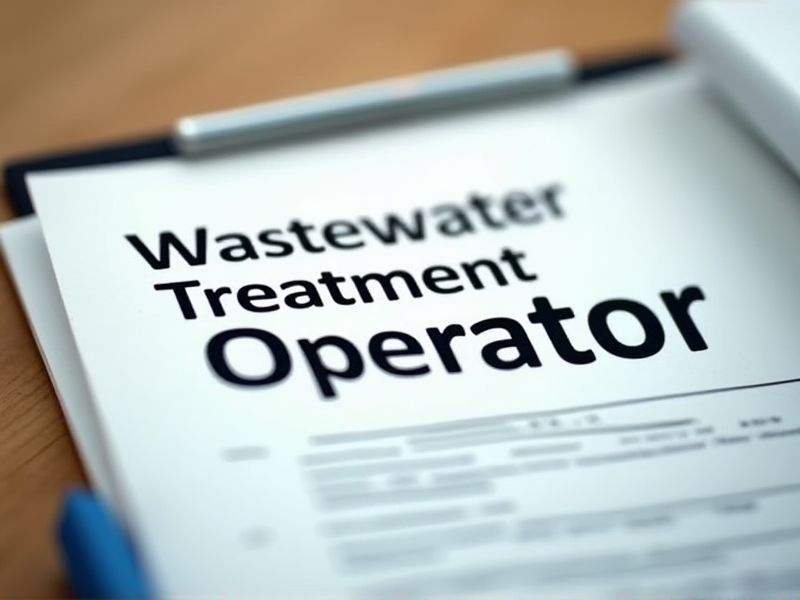
Wastewater treatment operators manage complex systems that ensure safe water recycling, demanding a precise understanding of technical and safety protocols. Certifications validate an operator's skills in handling chemical processes and maintain compliance with health regulations to protect public and environmental health. Rigorous training and assessment through certifications help maintain operational standards critical to preventing waterborne diseases and environmental hazards. Key certifications for a wastewater treatment operator include those related to water treatment process efficiency and safety compliance.
Class I Wastewater Treatment Operator Certification
The Class I Wastewater Treatment Operator Certification is needed because it ensures that operators have the necessary skills to maintain and manage wastewater systems effectively. This certification provides the foundational knowledge required to protect public health and the environment by ensuring safe wastewater treatment processes. Certified operators help reduce the risk of environmental contamination due to improper handling of wastewater treatment facilities. This credential supports compliance with federal and state regulations, which mandates qualified personnel for essential public safety and environmental protection functions.
Class II Wastewater Treatment Operator Certification
Class II Wastewater Treatment Operator Certification ensures operators have the necessary skills and knowledge to manage complex treatment processes effectively. It addresses regulatory requirements, ensuring wastewater treatment facilities comply with environmental standards to protect public health. Certification reflects an operator's expertise in maintaining operational efficiency and safety in wastewater management. Certified operators are better equipped to adapt to technological advancements in the wastewater treatment field.
Advanced Wastewater Treatment Operator Certification
Advanced Wastewater Treatment Operator Certification enhances the technical proficiency of operators, ensuring they can manage complex treatment processes. It promotes adherence to stricter regulatory standards, reducing environmental pollution. Equipped with certification, operators can troubleshoot effectively, minimizing operational downtime. Certification validates an operator's skills and knowledge, leading to increased public trust and safety assurance.
HAZWOPER Certification
HAZWOPER Certification is essential for a Wastewater Treatment Operator because it ensures they are adequately trained to handle and manage hazardous substances that might be present in wastewater. It helps operators understand and implement effective safety protocols, reducing the risk of accidents and exposure to harmful chemicals. Regulatory compliance with OSHA standards requires operators involved in hazardous waste operations to possess HAZWOPER Certification. A certified operator can respond more effectively to emergencies, ensuring safe and efficient site operations.
OSHA 10-Hour Certification
Wastewater treatment operations involve handling hazardous chemicals and machinery, which increases the risk of workplace injuries. The OSHA 10-Hour Certification provides essential safety training, helping operators recognize and avoid potential hazards. Completion of this certification often leads to improved operational efficiency and reduced incidents. Some states and employers mandate it to ensure a baseline understanding of safety protocols among all treatment personnel.
Confined Space Entry Certification
Wastewater treatment operators work in environments with potentially hazardous atmospheres and limited ventilation, making confined space entry certification necessary to ensure safety. Proper certification equips operators with the skills to recognize and mitigate risks associated with toxic gases, low oxygen levels, and physical entrapment. Regulatory compliance laws, such as OSHA standards, require this certification to protect workers and avoid legal repercussions. The training reduces incidents and fatalities by empowering operators to perform their duties safely and effectively in confined spaces.
HAZMAT Certification
HAZMAT Certification ensures that a wastewater treatment operator is equipped to handle and manage hazardous substances safely. This certification reduces the risk of chemical accidents, which can result in environmental contamination and worker injuries. Regulatory compliance is critical in wastewater treatment, and HAZMAT training supports adherence to EPA and OSHA standards. Proper handling and disposal of hazardous materials prevent costly fines and potential legal liabilities for wastewater facilities.
Process Control Certification
A Process Control Certification ensures that a wastewater treatment operator is equipped with the necessary knowledge to manage systems effectively, reducing the risk of operational errors. Certified operators contribute to the consistent adherence to environmental regulations, lowering the likelihood of fines or sanctions. Training associated with certification promotes the implementation of advanced technologies and practices, leading to improved efficiency and safety in wastewater treatment. Certification tends to enhance public trust and support for facilities, as it signals a commitment to maintaining high standards in environmental protection.
Water Quality Laboratory Technician Certification
Water Quality Laboratory Technician Certification provides operators with the necessary skills to accurately test and monitor the chemical composition of water, ensuring safety standards are met. Certification ensures operators are trained in advanced testing techniques, crucial for detecting contaminants and preventing environmental harm. Regulatory bodies often require such certification to comply with legal standards and avoid violations. Certified technicians can contribute to more efficient plant operations by providing accurate data, guiding effective treatment processes.
Environmental Management Systems (EMS) Certification
Environmental Management Systems (EMS) Certification is necessary for wastewater treatment operators because it ensures compliance with environmental regulations, which minimizes potential legal liabilities. Such certification helps in systematically managing environmental impacts, ultimately leading to improved operational efficiency. It enhances reputation and credibility, which is crucial for securing trust from the community and regulatory bodies. The certification encourages ongoing training and development, promoting a culture of continuous improvement and innovation in wastewater management practices.
Summary
With certifications, you can expect to enhance your technical skills and knowledge, leading to better job performance as a Wastewater Treatment Operator. Certification often makes you more competitive in the job market, increasing your chances for employment opportunities and career growth. Employers tend to value certified operators, which can result in higher pay and job stability for you. Certified professionals also contribute to more efficient and effective wastewater management, benefiting the environment and public health.
